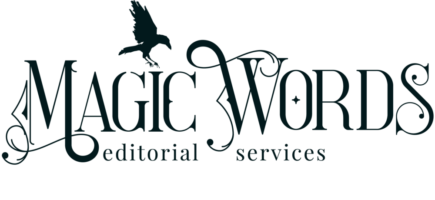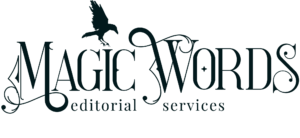THE “WHAT”
What genres do you edit?
All of them! I focus mainly on speculative fiction—fantasy, horror, sci-fi, plus all of their subgenres—because those are my favorite stories to read, but I love fiction of all kinds. If you have a brainy literary story and think I’m the editor for you, bring it on! If you have a heart-thudding thriller on your hands, I’m your gal. An inspirational memoir? Gimme! I even occasionally take on nonfiction: self-help, spirituality, specific subject matter. I’m a former interior designer and have a soft spot for home décor and lifestyle books. I typically don’t do straight romance (don’t read it, not into it), but if your book has romantic overtones within another genre, such as with a romantasy, I’m all for it.
What are your editing qualifications?
Just the facts, ma’am:
- Experience copyediting and proofreading for Macmillan imprints such as Tor, Nightfire, Forge, St. Martin’s Press, Wednesday Books, Bramble, and others
- A bachelor’s of science in English literature and language with a minor in education
- A master’s in communications
- A certificate in editing from the University of Chicago—the folks who wrote the The Chicago Manual of Style, the style guide used by the publishing industry
- Extensive training in copyediting and proofreading from editing training organizations and membership associations
- Experience teaching literature, writing, grammar, and spelling to high school students
- Experience editing in a corporate environment within communications, public relations, and publications departments
- 40+ years writing short stories, poems, and novels
- 20+ years as a business owner
- Skill in and a lifelong love of reading fantasy, horror, sci-fi, speculative, literary, and many other kinds of fiction
You can find out more here.
What version of English do you edit?
I am an American speaker of the US-centric dialect of English, and that’s what I was trained on. I’m somewhat familiar with the differences in spellings, construction, mechanics, and well-known idioms in Canadian and British English. If you are Canadian, British, or Australian, or write in another English dialect, and plan to publish your book for the American market and audiences, an American-speaking editor can help apply US-specific conventions. In that case, I’d be right for your project.
If your goal is to release your book to your home-country audience, it’s probably better to find an editor who specializes in your dialect. I’m happy to pass along names of editors who can help.
Do you do developmental editing?
Yes. No. Sort of? Developmental editing focuses on plot, character development, structure, narrative, and other “big picture” items. Usually, a developmental edit will include in-manuscript markup plus a book map and an editorial letter. I do what I refer to as a “dev edit lite,” which I call a Story Diagnostic. I offer it as a standalone service or as part of my Full Editing Journey package. I look at everything included in a developmental edit and provide you with a diagnostic letter that generally addresses what works, what doesn’t work, thoughts and suggestions, and my opinion of the book’s publish-ability in its current form. A full developmental edit is usually only effective on a fully completed manuscript. But, my Story Diagnostic is perfect for manuscripts in any condition—finished, half-finished, unedited, or anything in between.
Will you edit my query/synopsis/blurb/website/social media?
Can you publish my book?
Alas, I am not a publisher nor do I offer publishing coaching (yet). However, keep an eye on the Magic Words Journal for the occasional blog post on the subject.
Can you help me find an agent?
I can certainly point you to helpful resources for finding an agent (or publisher), but the legwork to secure that agent will be yours, of course.
Do you work on AI-generated books or stories?
NOPE.
I do not work on manuscripts that include content of more than 1 percent of their total words created by generative AI or machine-learning models like ChatGPT, SudoWrite, Novel AI, or others. I also ask that you agree to disclose if your manuscript contains AI-generated content of any amount if we work together. (AI-assisted brainstorming, outlining, and story development is fine and does not have to be disclosed.)
In return, I also do not upload or in any other way feed your words into generative AI programs like the above, including ProWritingAid, AutoCrit, or Grammarly. I use a non-AI assistive plug-in for Microsoft Word called PerfectIt as a one-last-pass tool to help enforce consistency of my edits across the entirety of your manuscript. It in no way requires me to feed your work into any kind of AI-like algorithm. Here’s more info about that: Why We’re Not Adding AI to PerfectIt.
Your words and your creativity are safe with me, and I back that up by including a clause to that effect, for you and for me, in my standard contract.
THE “HOW”
How do you edit?
I use Microsoft Word. I work directly in a copy of your manuscript and make my edits using Word’s Track Changes feature. Prior to beginning my edit, I’ll do what’s called “silent edits”—fixing double spaces, straight quotes, ellipses, and other formatting issues—which won’t be tracked. As I work, I add items to the style sheet I create for your book (see more about the style sheet below). I’ll also have a fuzzy assistant or two or three sleeping at my feet, chillout tunes in the background for focus, and a cup of coffee or tea to keep me going.
Do you use AI to edit? Will my work be used to train an AI model?
I do not utilize any online AI-assisted or machine learning model technologies that learn from your text or incorporate your words into its model. My tools consist of PerfectIt’s consistency checker, Microsoft Word’s spelling and grammar Editor, and 100% pure, old-fashioned, homegrown human intelligence and training. I take every precaution to keep your work safe from incorporation into machine-learning or generative-AI models.
Are you available for questions during editing?
Totally! I don’t do phone calls, but send me an email with your questions and I’ll respond within 24 hours. Also, I may have questions for you as I edit, so keep an eye on your inbox.
Why don't you do phone calls? What about Zoom?
Straight-up-honesty time: I’m deeply introverted (according to the Myers-Briggs, my preference for introversion falls off the edge of their scale), suffer from a touch of social anxiety, and suspect I’m also a bit neurospicy (of the ADHD flavor, undiagnosed). I’m not at my best during phone calls or in other situations where I have to communicate quickly and “off the cuff.” I’m more clear and accurate when I can take my time to think through what I need to say, so writing is my sharpest tool. You’ll get better, more thorough answers from me when I can email them to you.
That being said, if you’d be more reassured that I’m an actual person—and not, say, an AI bot—if you saw my face, I’m nervously open to doing a Zoom call to say hi. For no more than ten minutes. Okay, maybe five. And don’t judge if I babble incoherently and my face turns fifty shades of pink and then I end the call in the absolute most awkward-penguin way. And then send you an email to explain that I do really like you, I’m just weird. ?
What style guide do you use?
For my indie author clients (meaning authors who have not yet secured a publisher or know they will be self-publishing), I use The Chicago Manual of Style, 17th ed. It’s the preferred style of the book publishing industry. When I work directly for publishing houses, I use a combination of CMOS and the house’s style guide. For dictionaries, I use the online version of Merriam-Webster’s Unabridged dictionary.
What's a style sheet? Do you provide a style sheet?
A style sheet is a record of all the decisions you’ve made as an author and all the decisions and changes I’ve made as an editor. Examples: “gray” is spelled with an “a” in American English, “jobsite” is one word, etc.
It also tracks characters, settings, or any other book details that should remain consistent throughout the book. Examples: Bill’s eyes are blue, the Galactic Jetstar has 12 decks, etc.
I provide a style sheet for every Style Tune Up and Nuts and Bolts project I work on.
Do you do a sample edit?
Yes! I provide a free trial edit for any Style Tune Up or Nuts and Bolts project. Trial edits are not available for any other service offering. You can apply for a trial edit here.
Will you guarantee that you won't steal my work or ideas?
I hear the concern in this question. What you’re really wanting to know is if your work is safe with me. I get this sometimes from newbie authors who’ve heard horror stories about beta readers or critique partners or random internet strangers writing and publishing books with similar ideas to a book another indie author wrote.
First, I want to direct your attention to this article from Jane Friedman that offers a reality check for authors worried that service professionals (or anyone) will steal their work: Are You Worried Your Ideas and Work Will Be Stolen? The gist: ideas can’t be protected, but no one else can develop an idea the same way you would, and copyright/authorship is simple to prove and enforce so it’s not worth worrying about.
Second, my letter of agreement includes a clause that reiterates the information included in that article: an author owns and maintains the copyright on their work the second they write it. Copyright on and establishing the date of a prior draft is easily provable if it’s in electronic format.
Third, I’m a member of several professional editing and writing associations that apply a code of conduct and/or ethics standards to their members, which include how to handle client work and information. I take these codes and standards seriously and don’t desire to violate them.
Next, I also definitely don’t want to risk my professional reputation and livelihood. I adore my job and want to keep doing it for a very long time. Stealing author work and passing it off as my own would be easily discoverable, and I’ve seen how quickly authors share information about bad actors on social media. Not gonna happen.
In addition, I’d be happy to share with you the names and contact information of numerous previous clients, mentors, and production editors at traditional publishing houses with whom I’ve worked. They would love to vouch for my professionalism and trustworthiness.
Finally, if it helps you feel more secure, I would be happy to review a lawyer-prepared non-disclosure agreement prior to you sharing your full manuscript, and I’d be thrilled to sign it once my own legal counsel approves its terms.
And here’s a bonus reason why I won’t steal your story: I don’t have time to work on my own book, much less filch yours and put in all the effort to fix it up and publish it. I’m too busy editing.
All of that is about the best guarantee I can give you.
THE “WHEN”
What's your schedule like? When can you fit my project into it?
I’m currently maintaining a waitlist of authors who’ve expressed interest in working with me. I open the waitlist on a rolling basis around the first of every quarter, first to existing clients and then to authors at the top of the list. Scheduling your project will depend on my availability and your position on that list, so definitely apply to work with me as soon as possible to add your name! Sometimes another author will reschedule, and I can shuffle projects around or open up a spot to the next author in line. I’ll let you know if that occurs and give you the choice to move into that slot.
What's your turnaround time?
General timeframes are listed on my services page. I can typically turn around a project in 2-4 weeks. That timeframe depends on your schedule, the cleanliness of the manuscript, its length and complexity, and any other work or family obligations I have. We’ll discuss a specific timeline for your project during your application.
When do I know my manuscript is ready to be edited?
That’s a tricky question with lots of answers. Generally, a book can benefit from a Story Diagnostic (a manuscript assessment) at any point during the writing process (but it’s more helpful if the story is mostly written).
When your manuscript is a.) finished, b.) been through all rounds of critique and beta reading, and c.) you’ve incorporated all feedback you’re going to accept and have done all the rewrites you’re going to do, I usually recommend developmental editing at this point. You can either opt for a manuscript assessment (my “dev edit lite” service mentioned above, a Story Diagnostic) or a full developmental edit, especially if you’re still struggling with writing craft issues. Since I don’t offer full developmental editing, I can recommend several five-star editors who do. (I can also help you determine if your story needs an assessment or a full dev edit.)
Once you’ve integrated your developmental edits and completed any necessary rewriting, then your book can be line or copyedited (my Style Tune-Up or Nuts and Bolts services). It’s generally best to do the line or copyedit once you’re absolutely, positively, 100% sure you won’t touch your manuscript again or do any more writing, which might introduce more word baubles or typos.
Still confused? Here’s a quick quiz that will walk you through figuring it out. Or, contact me and I’ll offer my thoughts.
THE “WHY”
Why should I hire an editor?
The best answer to this question can be found here: Why Do You Need An Editor? The Brutal Truth
Why should I hire an editor if I plan to send my work to literary agents?
If you’re asking whether you should hire an editor to do a line or copyedit on your book before you attempt to secure a literary agent, generally my answer is yes, probably. Agents get tons of submissions—you have a lot of competition for their time and attention. Sometimes the smallest things—like typos or grammar errors on the first few pages—will be enough to cause them to pass, especially if you write in a market-saturated genre. Here’s more information on that: 7 First-Page Mistakes That Get Your Manuscript Tossed in the “No” Pile. (Tip: one thing you could do if you’re not ready to shell out for a full edit until you see how your story will be received by agents is hire an editor for your first five chapters only.)
If you’re asking whether you should hire an editor to help you perfect your query and synopsis—yes, yes, a thousand times yes! I can help you there.
Why are you the right editor for my book?
The honest answer: I might not be! The right editor is not just the person with the right qualifications, but someone you gel with, who “gets” your book and the way you write. The only way to tell if I’m the right editor is to apply for a free trial edit. A trial edit will give you a good sense of how I’ll edit your book, how I’ll treat your writer’s voice, and how I’ll go about doing your edit. And to figure out if we “gel” or not? Pay attention to how I communicate in emails and even on this website! Do you like my personality and tone? Do I come across as a person you can respect and get along with? Do you feel validated and seen as a writer? Only you can answer those questions through what you read and how I treat you. I hope my love for you as a human being and for your writing shines through!
THE “HOW MUCH”
What are your prices?
I have a project-based pricing model, which means I assess the project as a whole before I assign a cost (which is why it’s important that I see your entire manuscript before the sample edit or before I generate a quote). The rate I charge is customized for your particular project, and it factors in the following: the word count of your story, your desired turnaround time, and the cleanliness and complexity of your manuscript. If, for budgeting reasons, you need a ballpark cost, let me know, and I’ll be happy to provide you with a range that your project might fall into. And each of my services on this page includes a typical investment range stated as a per-word cost.
Or, check out the Editorial Freelancers Association’s rates page. It lists rates reported by a survey of editors in 2019 for different categories of editing work. While it’s not particular to your book, and the rates have not been updated for inflation, the list should give you an idea of what to expect.
I have a really short story. Do you have a minimum charge?
I don’t have a minimum charge, as I price per project. That said, I typically don’t work with anything shorter than 5,000 words. (But exceptions can always be made for the right story!)
Do you offer payment plans?
Yes, payment plans are available. A deposit is required, and then payment arrangements are custom designed for your situation.
Do you take credit card/PayPal/check/cash/gold bullion/crypto/NFTs?
I accept credit cards of all persuasions (Master Card, Lady Visa, Sir Discover, Lord American Express). I can do PayPal. I prefer the previous methods over a check. Cash, no. Gold bullion would be interesting (and probably a good idea given things **waves arms around at the state of the world**), but also no. I’m too old to understand crypto, so nope, sorry. And NFTs? Boy, do I have news for you.




